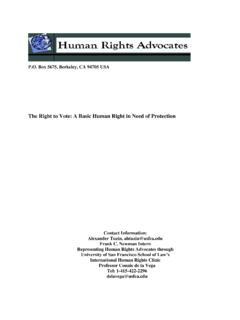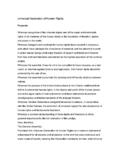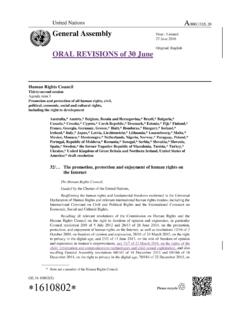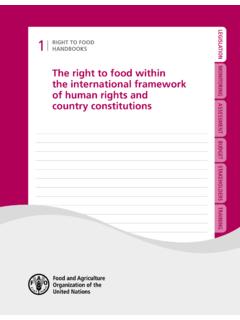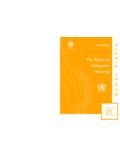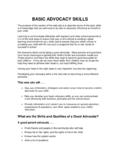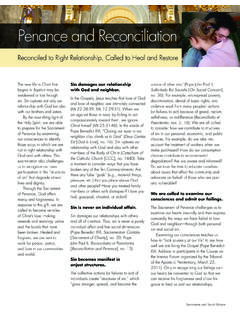Transcription of Research ethics committees: Basic concepts for capacity ...
1 Research ethics committeesBasic conceptsfor capacity -buildingResearch ethics committeesBasic conceptsfor Library Cataloguing-in-Publication DataResearch ethics committees : Basic concepts for ethics , Research - education. 2. ethics committees, Research - organization and administration. 3. Research support as topic. 4. Manuals. I. World Health 978 92 4 159800 2 (NLM classification : W ) World Health Organization 2009 All rights reserved. Publications of the World Health Organization can be obtained from WHO Press, World Health Organization, 20 Avenue Appia, 1211 Geneva 27, Switzerland (tel.)
2 : +41 22 791 3264 ; fax : +41 22 791 4857 ; e-mail : Requests for permission to reproduce or translate WHO publications whether for sale or for noncommercial distribution should be addressed to WHO Press, at the above address (fax : +41 22 791 4806 ; e-mail : The designations employed and the presentation of the material in this publication do not imply the expression of any opinion whatsoever on the part of the World Health Organization concerning the legal status of any country, territory, city or area or of its authorities, or concerning the delimitation of its frontiers or boundaries.)
3 Dotted lines on maps represent approximate border lines for which there may not yet be full mention of specific companies or of certain manufacturers products does not imply that they are endorsed or recommended by the World Health Organization in preference to others of a similar nature that are not mentioned. Errors and omissions excepted, the names of proprietary products are distinguished by initial capital reasonable precautions have been taken by the World Health Organization to verify the information contained in this publication. However, the published material is being distributed without warranty of any kind, either expressed or implied.
4 The responsibility for the interpretation and use of the material lies with the reader. In no event shall the World Health Organization be liable for damages arising from its use. Photo credits : WHO : cover, , WHO/H. Anenden : WHO/Christopher Black : , , : WHO/Marko Kokic : WHO/EURO : : by the WHO Document Production Services, Geneva, .. 4 Glossary .. 5 Introduction .. 9 Research ethics committees .. 11 Ethical analysis .. 19 Organizing a training programme .. 25 Evaluation of risks and benefits .. 29 Confidentiality.
5 37 Informed-consent process .. 43 Annex 1 Financial conflicts of interest in medical Research .. 51 Annex 2 Guidelines and regulations .. 633 AcknowledgementsThis document was prepared by Carl Coleman, Trudo Lemmens, Tarun Mehra and Aissatou Toure, under the coordination of Marie-Charlotte Bou sseau, ethics and Health Unit, Department of ethics , Equity, Trade and human Rights, WHO. We gratefully acknowledge the technical and financial assistance of the PATH Malaria Vaccine Initiative and the inputs of Myl ne Botbol Baum, Marc Guerrier, Reva Gutnick and Laurence Lwoff.
6 4 GlossaryAssent :A variation on consent where a person who does not possess full com-petence to give informed consent gives affirmative agreement to partic-ipate in Research . For instance, a child or person with dementia should give assent before being enrolled in Research . However, it is important to note that assent does not eliminate the need for obtaining the per-mission of a parent or other legally authorized :A field of ethical enquiry that examines ethical issues and dilemmas arising from health, health care and Research involving :Refers to a potential or enrolled participant s mental capacity to provide informed form :An easily understandable written document that documents a potential participant s consent to be involved in Research and describes the rights of an enrolled Research participant.
7 This form should communicate the following in a clear and respectful manner : Research timeframe ; title of Research ; researchers involved ; purpose of Research ; description of Research ; potential harms and benefits ; treatment alternatives ; state-ment of confidentiality ; information and data to be collected ; how long the data will be kept, how it will be stored and who can access it ; any conflicts of interest ; a statement of the participant s right to withdraw from participation at any point ; declarative statement of understanding that the potential participant agrees to and signs.
8 The consent form should be in a language the potential participant understands. For potential participants with limited literacy, the verbal communication of the consent-document details should be provided along with proper documentation of consent, if it is and data linkage :The process of de-identification (anonymization) and linking of collected Research trial data and identifiable private information. This process ensures that items of data are not individually identifiable, but provides a mechanism for appropriate access to identifiable guidelines :Guidance documents which assist with decisions relating to the responsi-bility to adhere to established and relevant standards of ethical principles and practice.
9 Personal data :Data that relate to a living person and contain personally identifying investigator (PI) :The main researcher overseeing or conducting the Research process. Researcher :A person who engages in the methodical and systematic investigation of hypotheses with the goal of contributing to new ethics committee (also known as ethical review board (ERB), ethical review committee (ERC), human Research ethics committee (HREC), institutional review board (IRB)) :Group of individuals who undertake the ethical review of Research proto-cols involving humans, applying agreed ethical involving human participants.
10 Any social science, biomedical, behavioural or epidemiological activity that entails systematic collection or analysis of data with the intent to generate new knowledge ; in which human beings :1) are exposed to manipulation, intervention, observation or other interaction with investigators, either directly or through alteration of their environment ; or2) become individually identifiable through investigators collec-tion, preparation or use of biological material or medical or other protocol :A document written by the investigator(s), which should contain a project summary ; general information ; background rationale ; references and literature review ; study goals and objectives ; study design ; meth-odology ; safety considerations ; follow-up ; data management considera-tions and statistical analysis ; quality assurance ; expected outcomes of the study.










